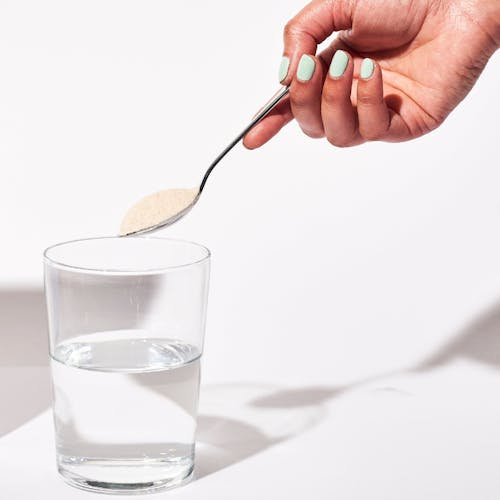This website uses cookies to enhance the user experience. By using Yoppie you are agreeing to our use of cookies.
PCOS And Diabetes: What You Need To Know
Written by Yoppie
28 Feb 2022
How is PCOS linked to type 2 diabetes?
Can PCOS cause type 2 diabetes?
Can type 2 diabetes cause PCOS?
At what age do I need to worry about PCOS and diabetes?
Why is my weight important?
What do I need to watch out for?
If you’re a regular reader of the Full Stop blog for info on PCOS, then you’ll probably have seen insulin mentioned in the past, and how the condition is linked to type 2 diabetes. We thought we’d do a deep dive on this topic; is there a relationship between the two? What’s insulin got to do with it? Can one cause the other? Let’s get into it…
How is PCOS linked to type 2 diabetes?
The relationship between polycystic ovary syndrome (PCOS) and type 2 diabetes comes down to one common factor: insulin. PCOS affects the endocrine system, and as a result can cause insulin resistance. This means high levels of insulin are produced by the pancreas which can cause an adverse reaction - hello type 2 diabetes! Researchers are still unsure of how some types of PCOS can cause insulin resistance, but numerous studies have found there is a connection.
According to Diabetes.co.uk, a 2012 UK study found the risk of developing type 2 diabetes was notably higher for those with PCOS, and data collected in Australia found subjects with PCOS were 4 to 8.8 times more likely to develop type 2 diabetes. Similarly, a 2017 study of Danish women found those with PCOS were 4 times as likely to get type 2 diabetes, and tended to be diagnosed on average 4 years earlier than those without PCOS… it’s clear there are more than a few signs suggesting a strong link between the two!
Can PCOS cause type 2 diabetes?
Yes, it can. Insulin resistance is a major contributing factor to PCOS, and increased insulin levels can cause weight gain. As a result, type 2 diabetes can develop over time. People with insulin resistant PCOS have been found to be around 40% more likely to develop type 2 diabetes at some point in life, so dealing with PCOS symptoms and starting to implement healthy habits as early as possible is hugely important.
Can type 2 diabetes cause PCOS?
There is no research to suggest this works the other way around. However, according to the CDC, if your mother or sister has type 2 diabetes you may be more likely to develop PCOS. If this is the case for you, you may want to monitor yourself for symptoms of PCOS more closely than most. These include missed, irregular or very light periods, excess body hair or thinning hair on the head, weight gain, acne or oily skin, or fertility issues. If you have symptoms, speak to your GP to check this out.
At what age do I need to worry about PCOS and diabetes?
If you have been diagnosed with PCOS, it’s best to consider the connection to type 2 diabetes and implement healthy lifestyle habits as early as possible. People who have PCOS in young adulthood have an increased risk of diabetes in later life, so learn how your body works in order to recognise the early warning signs.
As you get older, type 2 diabetes becomes more of a possibility; one study found the risk of type 2 diabetes goes up for middle-aged people with periods who haveh PCOS, while the Office on Women’s Health say around half of those with PCOS tend to develop either diabetes or prediabetes before age 40. There is also research suggesting around 27% of premenopausal people with type 2 diabetes also have PCOS, so it’s clear at every stage in life there remains a link.
Why is my weight important?
Several lifestyle factors must be considered when talking about the possibility of type 2 diabetes, such as stress levels, the amount of sleep you get, the amount of exercise you do, your diet, and so on. Probably the most crucial area to look at is weight, as type 2 diabetes is known to occur more commonly in overweight or obese individuals. Studies have concluded people with PCOS are more likely to be overweight, but it’s not always the case; some are more insulin-resistant than others, no matter their BMI.
If you’re overweight, speak to your doctor about getting support to lose weight in order to improve your symptoms and avoid prediabetic issues. If you are not overweight but you have PCOS, you should still be checked by a doctor semi-regularly to ensure the condition doesn’t develop into type 2 diabetes down the line.
What do I need to watch out for?
If you have PCOS, regular check-ups are important to make sure you are not inching into prediabetic territory. Prediabetes can still be reversed with lifestyle changes, but once you become fully type 2 diabetic it’s much more difficult. Watch out for symptoms of prediabetes, such as increased thirst, frequent urination, excess hunger, fatigue, and blurred vision.
If you suspect you may be having issues with blood sugar or any of these symptoms, don’t delay visiting your doctor to make sure everything is as it should be. If it’s not, they can recommend lifestyle changes to keep you at optimum health and help you avoid developing type 2 diabetes later in life.
Got a question about PCOS, type 2 diabetes, or both? Reach out to our Full Stop FB group, or come say hello to us directly on Instagram at @itsyoppie. Don't forget that our personalised menstrual care subscription can get organic tampons, PCOS supplements and much more delivered easily and regularly through your letterbox, to help keep at least some of that PCOS annoyance under control each month.
Section jump
Back to top
Subscribe To Our Newsletter
YOPPIE





© 2026 Yoppie is a registered trademark of Phlo Technologies Ltd.
Yoppie's supplements are not a substitute for a varied diet and healthy lifestyle and are not intended to diagnose, treat, or cure any disease. If you are pregnant, breastfeeding, have a medical condition or are under medical supervision, please consult with your doctor before taking any of our products.







